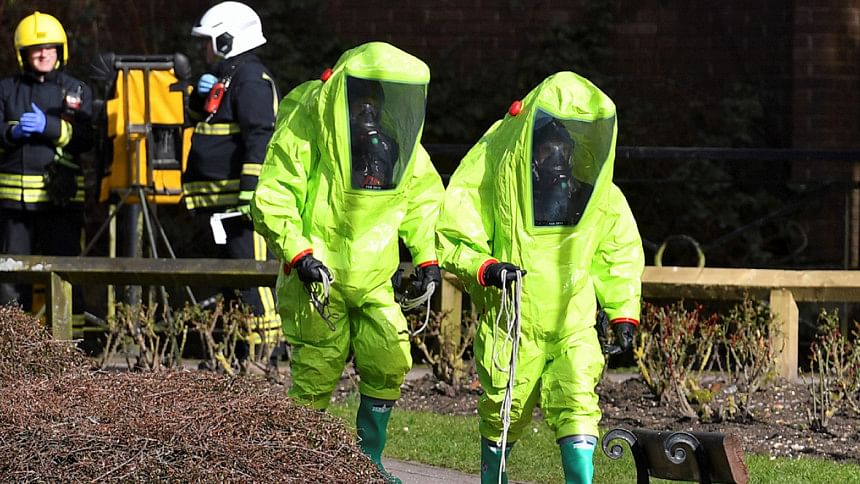UK holds emergency meeting on new nerve agent case

Britain is holding an emergency cabinet meeting on Thursday over a couple who were left critically ill after being exposed to the same nerve agent used on a former Russian spy earlier this year.
Home Secretary Sajid Javid will be chairing the talks in London, as counter-terrorism police lead an investigation into the incident in Amesbury, a village in southwest England.
Also read: Couple in critical condition in UK
The village is close to the city of Salisbury, where former double agent Sergei Skripal and his daughter Yulia were found slumped on a bench on March 4 in an incident that sparked a diplomatic crisis with Russia.
"The possibility that these two investigations might be linked is clearly a line of enquiry for us," said Neil Basu, head of Britain's counter-terrorism police force.
Police on Wednesday said that tests at Britain's Porton Down defence laboratory had confirmed that the substance was Novichok, which Britain says is a Soviet-made military grade nerve agent.
"The priority for the investigation team now is to establish how these two people have come into contact with this nerve agent," Basu said.
"We have no idea what may have contained the nerve agent at this time," he said, urging members of the public not to pick anything up if they did not know what it was.
The police chief said it was the same nerve agent used against the Skripals but "whether we can ever tell if it's the same batch will be up to scientists to determine".
Basu said there was no evidence to suggest that the man and the woman, named locally as Charlie Rowley and Dawn Sturgess, "were targeted in any way".
'Low risk' to public
Basu said there was no evidence the man and the woman had "recently visited any of the sites that were decontaminated" after the poisoning of the Skripals.
"This remains a low risk to the general public," he said.
"We're satisfied that if anyone was exposed to that level of nerve agent by now they would be showing symptoms."
The 44-year-old woman collapsed first and an ambulance was called at around 0915 GMT, while the 45-year-old man fell ill later and an ambulance was called at 1430 GMT to the same house in Amesbury.
Police had initially assumed that the two had consumed contaminated drugs.
But samples from both patients were sent to Porton Down on Monday "due to concern over the symptoms the man and woman were displaying," Basu said.
Both are still in a critical condition and are at Salisbury District Hospital -- the same facility where the Skripals were treated.
Local man Sam Hobson, 29, told AFP he was a friend of the pair and said he saw the man fall ill.
"He was sweating loads, dribbling, and you couldn't speak to him, he was making funny noises and he was rocking backwards and forwards," Hobson said.
"It's like he was in another world."
Helplines for residents
In Salisbury, local residents said they were "shocked" that their quiet area was again hitting the headlines.
"I was shocked to hear that something had happened so soon after the last contamination scare," Patrick Hillman, 70, told AFP.
The Skripal poisoning "really affected business and life in general in Salisbury" in recent months, he said.
"It is a bit of a scare," said John Reid, 84.
Police launched two helplines for those worried about possible contamination.
"We cannot underestimate the impact the shocking news of a second major incident in this part of our county in such a short space of time will have," Wiltshire Police Chief Constable Kier Pritchard said in a statement.
Police called for calm but also said that anyone who had visited any of the five sites that the man and the woman went to on Friday and Saturday should wash clothing worn at the time and wipe down personal items.
The sites, which have now been cordoned off, are a park and a homeless hostel in Salisbury, as well as a pharmacy, a church and the house in Amesbury.
'Such a quiet place'
Local resident Natalie Smyth, 27, told AFP she saw fire engines and ambulances arrive at the house on Saturday.
"They shut the road. They said it was a chemical incident and then that it was drug-related.
"It is so strange, it is such a quiet place," she said, indicating that the emergency services personnel were wearing protective suits.
The police said local residents should expect to see officers in protective suits at "a number of sites" in the coming days.
Skripal, 67, and his 33-year-old daughter Yulia, who was visiting from Moscow, were treated for an extended period of time before being released from hospital.
A police officer who came to their aid, Nick Bailey, was also taken to hospital.
The police said they suspected the nerve agent may have been smeared on a front door handle in liquid form.
Moscow has rejected British accusations of involvement in the Skripal poisoning, which sparked a diplomatic crisis that saw Russia and the West expelling dozens of diplomats in tit-for-tat moves.

 For all latest news, follow The Daily Star's Google News channel.
For all latest news, follow The Daily Star's Google News channel. 








Comments